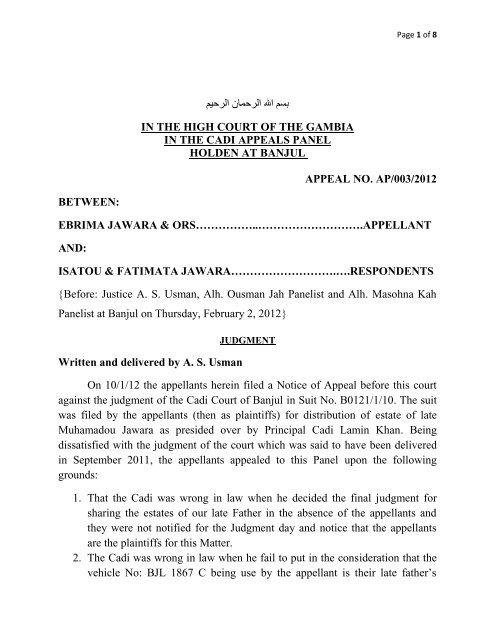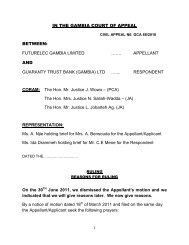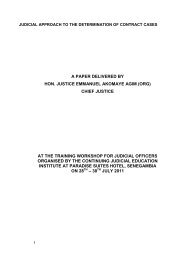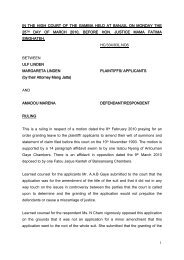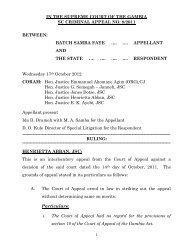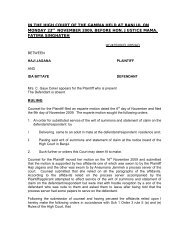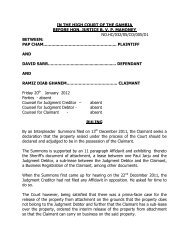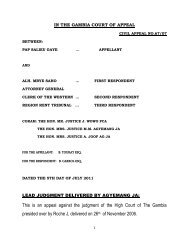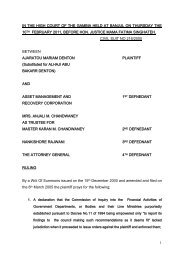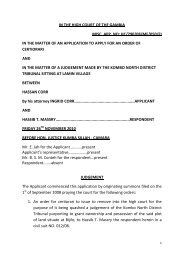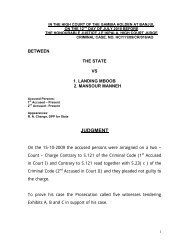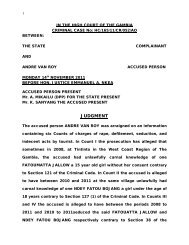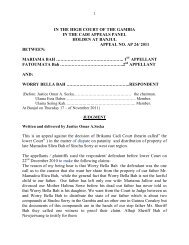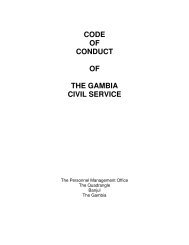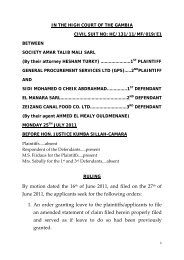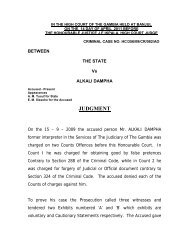IN THE HIGH COURT OF THE GAMBIA IN THE CADI APPEALS ...
IN THE HIGH COURT OF THE GAMBIA IN THE CADI APPEALS ...
IN THE HIGH COURT OF THE GAMBIA IN THE CADI APPEALS ...
You also want an ePaper? Increase the reach of your titles
YUMPU automatically turns print PDFs into web optimized ePapers that Google loves.
Page 1 of 8<br />
<strong>IN</strong> <strong>THE</strong> <strong>HIGH</strong> <strong>COURT</strong> <strong>OF</strong> <strong>THE</strong> <strong>GAMBIA</strong><br />
<strong>IN</strong> <strong>THE</strong> <strong>CADI</strong> <strong>APPEALS</strong> PANEL<br />
HOLDEN AT BANJUL<br />
APPEAL NO. AP/003/2012<br />
BETWEEN:<br />
EBRIMA JAWARA & ORS……………..……………………….APPELLANT<br />
AND:<br />
ISATOU & FATIMATA JAWARA……………………….….RESPONDENTS<br />
{Before: Justice A. S. Usman, Alh. Ousman Jah Panelist and Alh. Masohna Kah<br />
Panelist at Banjul on Thursday, February 2, 2012}<br />
Written and delivered by A. S. Usman<br />
JUDGMENT<br />
On 10/1/12 the appellants herein filed a Notice of Appeal before this court<br />
against the judgment of the Cadi Court of Banjul in Suit No. B0121/1/10. The suit<br />
was filed by the appellants (then as plaintiffs) for distribution of estate of late<br />
Muhamadou Jawara as presided over by Principal Cadi Lamin Khan. Being<br />
dissatisfied with the judgment of the court which was said to have been delivered<br />
in September 2011, the appellants appealed to this Panel upon the following<br />
grounds:<br />
1. That the Cadi was wrong in law when he decided the final judgment for<br />
sharing the estates of our late Father in the absence of the appellants and<br />
they were not notified for the Judgment day and notice that the appellants<br />
are the plaintiffs for this Matter.<br />
2. The Cadi was wrong in law when he fail to put in the consideration that the<br />
vehicle No: BJL 1867 C being use by the appellant is their late father‟s
Page 2 of 8<br />
belonging (estate) and the Cadi allowed to seized the vehicle from the<br />
appellant and give the respondents without reason known.<br />
It is really unfortunate that this case was badly handled by the lower court.<br />
The case has no any record in form of proceedings which can assist this panel in<br />
deciding the appeal on its merit. One will be astonished to hear that a case that has<br />
gone to the stage of execution could not produce a valid judgment in its case file<br />
talk less of any comprehensive proceedings which might have led to that judgment.<br />
The bad handling by the lower court has adversely affected the parties by putting<br />
them in a sympathetic situation and subjecting them to an endless litigation without<br />
any success of having the issues in controversy between them (i.e. a simple case of<br />
distribution of estate) resolved and settled once and for all.<br />
In an inheritance case such as this, as well as any other civil matter over<br />
which a Cadi Court can assume jurisdiction in the Gambia there ought to be a<br />
record of proceedings of what transpired in the case right from its inception when<br />
the complaint is lodged by a complainant, through the hearing and up to its logical<br />
conclusion by delivering judgment in the matter. The provisions of Order 7 Rules<br />
41and 42 and Order XIII Rule 77 of the Cadi Court (Civil Procedure) Rules 2010<br />
and Rules 4 and 5 of the Mohammedan (Banjul) Rules, a subsidiary legislation<br />
made under the Mohammedan Law Recognition Act Cap. 6:04 Laws of the<br />
Gambia should have served as a guide to the court in handling the instant case.<br />
Order 7 Rule 41 and 42 of the Cadi Court (Civil Procedure) Rules 2010 provides:<br />
“41. (1) The Cadi shall have overall conduct of the proceedings of the<br />
court and shall record same.”<br />
“42. The record of proceedings of each case the court proceeded with<br />
shall be signed by the Cadi and the members.”<br />
Rules 4 and 5 of the Mohammedan Court (Banjul) Rules also provides:<br />
“ 4. Minutes of the proceedings of the court shall be drawn up in the<br />
Arabic language or in the English language by such clerk or clerks.”<br />
“5. A record, to be called “The Mohammedan Court Record Book”<br />
shall be kept in Arabic or in English and all minutes shall be entered<br />
therein.”
Page 3 of 8<br />
Additionally, the lower court should have been guided by plethora of<br />
authorities under Islamic law which stresses the importance and necessity of<br />
recording of proceedings. It is because of the importance attached to<br />
documentation of judicial proceedings that Maliki School of law made it almost<br />
imperative for a judge to have a special scribe called „Katib‟ well learned in<br />
Islamic law who shall be charged with the task of documenting the proceedings of<br />
a case in the open court to enable the judge have full concentration on his judicial<br />
functions. See Nizamul Qada Fil Islam being a Selections of Papers Presented To<br />
The Conference On Islamic Jurisprudence Organized By The Islamic University Of<br />
Imam Muhammad Ibn Sa’ud At Riyadh Saudi Arabia In 1984 page 62. See also<br />
Tadwinul Murafa’at Al-Qadaiyya Fi Sharia Al-Islamiyyah by Sheikh Abdullahi<br />
Hunayn page 84 and Bahjah Commentary on Tuhfa page 74. In the said Bahjah it<br />
is provided:<br />
Meaning a case has no any binding effect if its proceedings are ambiguous.<br />
And it is imperative on a Judge to fully document his judgment and record same,<br />
the authorities he relied on for arriving at such judgment based on the testimonies<br />
of the witnesses that testified before him in the matter so that he can have a defense<br />
and a legal backing if the judgment debtor ultimately challenges his decision (on<br />
appeal).<br />
This appeal came up for hearing on 26/1/2012 with the appellants Ebrima<br />
Jawara and Mahmud Jawara in court while Isatou Jawara and Fatoumata Jawara<br />
appeared as respondents. For the defect of non availability of any record of<br />
proceedings pertaining to the case at our disposal as shown above, and in line with<br />
Order III Rule 9 of the Cadi Appeals Panel Rules 2009, the Panel decided to resort<br />
to questioning the parties to shade light on the proceedings for the purpose of<br />
elucidating and amplifying the record of the lower court with a view to arriving at<br />
the true facts of the case. The panel started with the date of judgment by the lower<br />
court which neither the appellants nor the respondents could avail the court with.<br />
The 2 nd respondent Fatoumata Jawara said the judgment was delivered in<br />
September, 2011 but could not tell the court which date in September.
Page 4 of 8<br />
It is interesting to note that prior to the filing of this suit, there was a similar<br />
suit with Case No. B001/1809/06 which was filed in the same court by one Mama<br />
Kabba Jawara one of the widows of the deceased person against Ebrima Jwara (the<br />
1 st appellant herein) sometimes between April and June 2006 for distribution of<br />
same estate but the case was not pursued to conclusion by the said Mama Kabba<br />
due to her demise. The appellants as well as the respondents stated before the court<br />
that their late father Muhamadou Jawara, who passed away in October 2004, left<br />
the following estate and beneficiaries, to wit:<br />
The Estate:<br />
1. Property at Tabokoto,<br />
2. Property at Churchill Town Serekunda,<br />
3. Property at Kanifing South,<br />
4. Property at 7 Louvell Square Banjul,<br />
5. Property at 16 Fitzerald Street Banjul and<br />
6. A Toyota 4 Wheel Drive<br />
The Beneficiaries:<br />
(a) Mama Kabba Jawara – 1 st Widow<br />
(i) Musa Jawara<br />
(ii) Idrisa Jawara<br />
(iii) Ceesay Jawara<br />
(iv) Jainaba Jawara<br />
(v) Isatou Jawara<br />
(vi) Fatimata Jawara and<br />
(vii) Mohammed Jawara (alis Bature).<br />
This last one, according to them predeceased their late father in September 11,<br />
2001 bombing of the World Trade Centre (WTC) in the USA.<br />
(b) Fatiamata Jawara – 2 nd widow<br />
(i) Ebrima Jawara<br />
(ii) Fatimata Jawara<br />
(iii) Mahmud Jawara<br />
(iv) Ali Jawara<br />
(v) Maryama Jawara<br />
(vi) Jatou Jawara<br />
(vii) Fatimata Jawara
Page 5 of 8<br />
(viii) Amara Jawara<br />
(ix) Abubakar Jawara and<br />
(x) Amie Jawara<br />
They also informed the court that there is another beneficiary from the late‟s<br />
divorced wife called Majigi Tunkara by name:<br />
(xi) Safi Jawara<br />
The 1 st appellant in line with ground 1 of the grounds of appeal argued that<br />
he was not notified of any date of judgment despite the fact that he was the<br />
plaintiff before the lower court. That he got to know that judgment was delivered<br />
when some policemen came to seize and in fact seized from him the Toyota 4<br />
wheel drive left by the deceased which he was using in solving the domestic<br />
problems of the beneficiaries. The appellant argued further that even the two<br />
properties in Tabokoto and Churchill Town; it was through KMC that he got to<br />
know that they were allocated to the respondents. He submitted further that all<br />
attempts to redress the lapses by convincing the lower court to have a second look<br />
at the irregularities were treated with contempt. This, he lamented further,<br />
informed his decision to appeal against the findings of the lower court to this panel.<br />
The 1 st appellant lastly submitted before us that he used to share the rents<br />
accruing from the landed properties of the deceased between all the beneficiaries<br />
after taking out what would suffice in solving the domestic problems of the<br />
household until in the last three years when the respondents herein refused to take<br />
their respective shares. That the respondents‟ shares so rejected were further<br />
expended on maintenance of the household. That within the three years that the<br />
respondents refused to take their respective shares, they personally collected rents<br />
totaling D72,000.00 from tenants in respect of two properties at Serekunda. He<br />
argued that some of his expenses were receipted for while others were not. The 2 nd<br />
appellant Mahmud Jawara adopted the arguments of the 1 st appellant and added<br />
that he used to be the intermediary through whom the respondents‟ shares were<br />
paid to them by the 1 st appellant except for the past three years when they refused<br />
to take it.<br />
The 2 nd respondent in her reaction to this ground of appeal, which argument<br />
the 1 st respondent equally adopted, maintained that the 1 st appellant, who was the<br />
plaintiff in the lower court has constantly refused to take service of the lower
Page 6 of 8<br />
court‟s processes and that even where the process server succeeded in serving him<br />
with a hearing notice the 1 st appellant would not show up to attend the trial. That<br />
the lower court was condoning the 1 st appellant on this until when it became fed up<br />
with his attitude that it decided to proceed with the case in his absence.<br />
On the issue of giving them their share of rent, the 1 st respondent as well as<br />
the 2 nd respondent argued that that assertion is false. That since the demise of their<br />
father about seven years ago, the 1 st appellant has never given them anything in<br />
form of rents due to them and on their part, they have never collected the sum of<br />
D72,000.00 as rent on any of the properties.<br />
On the second ground of appeal, the two appellants argued that the Toyota 4<br />
wheel drive No. BJL 1867 C formed part of the estate of their deceased father and<br />
the car has been in possession of the 1 st appellant for the past 7 years but the lower<br />
court ordered same to be seized and given to the respondents who in turn handed<br />
over same to their respective husbands for sale and same was accordingly sold out<br />
to an unknown buyer.<br />
The 2nd respondent reacted to this by stating that it was because of the<br />
persistent refusal of the 1 st appellant to appear before the lower court that the court<br />
decided to proceed with the case in his absence by distributing the estate to the<br />
beneficiaries. The appellants‟ side, according to the 2 nd respondent (Fatoumata<br />
Jawara) was given two houses at Churchills Town Serekunda and No. 16 Fitzerald<br />
Street Banjul while the respondents‟ side was given one house at Tabokoto plus the<br />
Toyota 4 wheel drive which car was still in their possession and has not been sold<br />
out as claimed. The 4 th house which is situated at 7 Louvell Square Banjul was to<br />
be shared between the appellants jointly with Safi Jawara. The 5 th house, the 2 nd<br />
respondent submitted further, was not shared but was left for their mother (Mama<br />
Kabba) in settlement of her own share from the compensation paid to them<br />
jointly(i.e. the deceased and Mama Kabba) by the US government on the death of<br />
their son Mohammed Jawara (alias Bature) who died on September 11, 2001 and<br />
which amount the deceased used all to the exclusion of the said Mama Kabba with<br />
a promise to pay her back and which he did not up to the time he died. The 1 st<br />
respondent (Isatou Jawara) adopted intoto the submissions of the 1 st respondent<br />
and said she had nothing to add.
Page 7 of 8<br />
We have carefully gone through the file of the case and the submissions of<br />
the parties in this appeal. As pointed out earlier, due to lack of record of<br />
proceedings there is no way the appeal can be decided on its merit. It is the record<br />
of proceedings that will guide this panel on how and why a decision of the lower<br />
court was arrived at and whether or not a proper investigation was conducted in the<br />
trial before taking the decision. In the case of Sa’adatu Mala Baba Vs Mal. Baba<br />
Mohammed (2007) 3 SLR PT IV P. 184 holding 8 the Court of Appeal in Nigeria<br />
Jos Division Held that It is emphatic under the Sharia that no judge should give<br />
judgment on a matter without investigating the complaint of both parties.<br />
Because of the apparent defect of lack of record of proceedings as earlier<br />
on indicated, we have no option than to disturb the findings (if any) of the lower<br />
court. The entire proceeding and or any finding of the lower court is hereby set<br />
aside. The Cadi Court of Bundung as presided over by Cadi Elman M. Nyang is<br />
herby ordered to retry the case. The matter should be given an accelerated hearing<br />
and concluded within the shortest possible period to curtail the hardship of the<br />
parties. As a guide to the retrial proceedings, the court should include amongst<br />
issues to be determined and in a well documented proceedings the following:<br />
1. Establishment of the death of the deceased,<br />
2. Establishment of the estate left by the deceased,<br />
3. Establishment of the beneficiaries left by him,<br />
4. Rents collected and any other proceeds accruing from the management of<br />
the estate left by the deceased if any right from the date of his death, and<br />
5. The issue of debt owed to late Mama Kabba by the deceased person being<br />
her share from the proceeds of compensation of about $448,958.00 paid to<br />
them jointly sometimes in or about May 29 th , 2003 by the US government<br />
as compensation for the death of their son Mohammed Jawara (alias<br />
Bature) who died in September 11, 2001 bombing of WTC.<br />
………….…………………….<br />
(Signed): Justice A. S. Usman<br />
………………………………….<br />
..………….……………………..
Page 8 of 8<br />
(Signed): Alh. Ousman Jah<br />
(Signed): Alh. Masohna Kah


